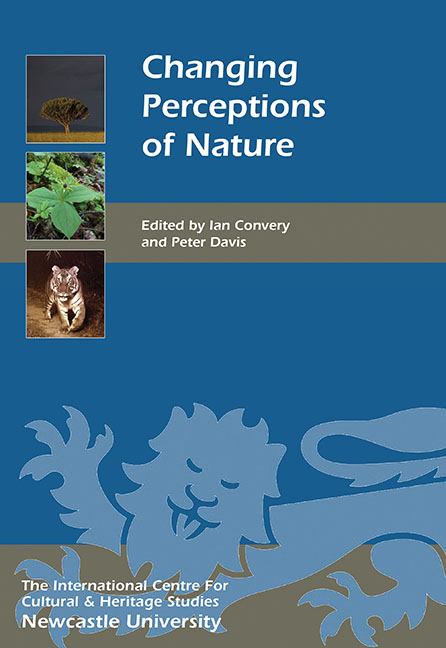Book contents
- Frontmatter
- Contents
- List of Illustrations
- Acknowledgments
- List of Abbreviations
- Foreword
- Introduction
- HISTORICAL PERSPECTIVES ON NATURE
- COLLECTING NATURE
- INTERPRETING NATURE AND LANDSCAPES
- 11 Changed Attitudes to Nature Reflected in the Transformation of Menageries to Zoos
- 12 Botanic Gardens: Changing Perceptions of Plants
- 13 Shifting Interpretations of the English Lake District
- 14 Facebook Nature: My Generation and Other Animals
- 15 Visual Narratives in Wildlife Film-making
- 16 A History of Half a Century of Wildlife Television and its Impact on Audiences
- 17 Landscape, Nature and the Contemporary Sublime in Illustrated Children's Literature
- CONSERVING NATURE
- PEOPLE–NATURE INTERACTIONS
- List of Contributors
- Index
- Miscellaneous Endmatter
17 - Landscape, Nature and the Contemporary Sublime in Illustrated Children's Literature
from INTERPRETING NATURE AND LANDSCAPES
Published online by Cambridge University Press: 26 October 2017
- Frontmatter
- Contents
- List of Illustrations
- Acknowledgments
- List of Abbreviations
- Foreword
- Introduction
- HISTORICAL PERSPECTIVES ON NATURE
- COLLECTING NATURE
- INTERPRETING NATURE AND LANDSCAPES
- 11 Changed Attitudes to Nature Reflected in the Transformation of Menageries to Zoos
- 12 Botanic Gardens: Changing Perceptions of Plants
- 13 Shifting Interpretations of the English Lake District
- 14 Facebook Nature: My Generation and Other Animals
- 15 Visual Narratives in Wildlife Film-making
- 16 A History of Half a Century of Wildlife Television and its Impact on Audiences
- 17 Landscape, Nature and the Contemporary Sublime in Illustrated Children's Literature
- CONSERVING NATURE
- PEOPLE–NATURE INTERACTIONS
- List of Contributors
- Index
- Miscellaneous Endmatter
Summary
INTRODUCTION
Illustrated children's literature has an important role in facilitating childhood interactions with the natural world, often helping to develop emotions and experiences that may resonate deep into adulthood. In the first section of this chapter we introduce and discuss the experiential concept of the sublime to illustrate its similarity to the experiential meaning of illustrated children's literature. We will then discuss the work of Dutch illustrators in creating imaginative landscapes for children (age 0–10 years). These landscape depictions invoke a characteristic aesthetic appeal that may guide children to experience and engage with different types of landscapes. On this basis we identify a series of four landscapes that relate to specific experiential themes.
‘SENSE OF SELF’ AND ‘SENSE OF PLACE’
Katniss Everdeen, the female hero of the Hunger Games trilogy by Suzanne Collins, has become an influential role model for young adult girls. She knows how to hunt, fight and survive in the wilderness and these skills help her to battle the dictatorial system of Panem. Katniss spends a great deal of time in the woods practising her hunting skills, (‘Gale says I never smile except in the woods’) and as a result is likely to have gained significant advantage over her competitors in The Hunger Games (Collins 2009, 6). As Atchley et al (2012, 1) indicate, higher order cognitive skills improve with sustained exposure to a natural environment.
The same can be said for the characters in the John Flanagan series Ranger's Apprentice and Brotherband. These types of narratives thrive on the experience of nature, either through a futuristic (usually dystopian) or historical projection. Nature has frequently provided a backdrop for the ‘life lessons’ of fictional characters. The transformative power of experiencing nature was recognised by Edmund Burke (1759, 45–73) in his definition of the sublime; something that is
productive of the strongest emotion which the mind is capable of feeling… [a] passion caused by the great and sublime in nature, when those causes operate most powerfully, is astonishment: and astonishment is that state of the soul in which all its motions are suspended, with some degree of horror. In this case the mind is so entirely filled with its object, that it cannot entertain any other, nor by consequence reason on that object which employs it.
- Type
- Chapter
- Information
- Changing Perceptions of Nature , pp. 171 - 182Publisher: Boydell & BrewerPrint publication year: 2016



